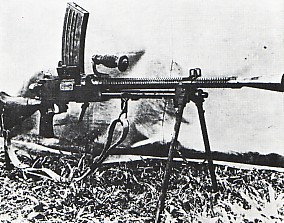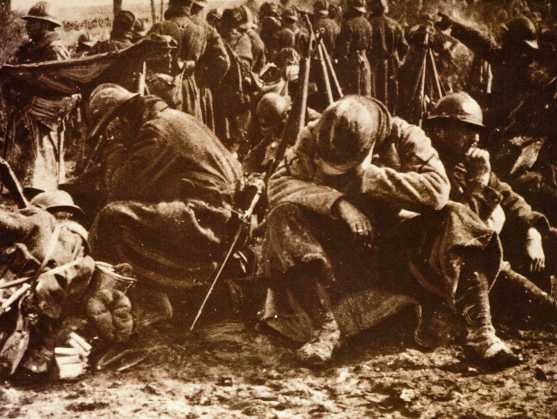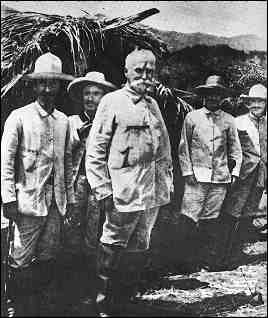Stalemate
The Marines, trained in the lastest stormtrooper tactics and armed with flamethrowers, grenades, mortars and the brand new light mobile machinegun, the NP05-MkIII, smashed all local garrison units within a few hours and secured a single united beachead within the week. As the Marines marched on Hamburg and Bremen and cut off Holstein from the rest of Germany along with some 30,000 troops on the Danish border, there was panic, not only amongst the general populace but in the High Command as well.

NP05-MkIII 'wheat cutter'
The Germans had not at all been ready for the war, and had expected an attack from the French border if anywhere, now faced with over 100,000 enemy troops in the North within striking distance of the industrial Ruhr valley and unsure about French plans, they had to split their 500,000 standing troops between these two fronts and the Polish border, as Krakow had launched a suprise attack on Russia only the day before the Red Fleet attack.
The German army that could be raised in times of war had dramtically grown since the New Years Revolutions, to some 1.5 million within a few weeks plus millions of volunteers, all with basic army training already, could be easily found and trained in a few months. The French had their own reserve of 1 million men and women and began a recruitment campaign immediately for more. The ASR's military machine was somewhere between the massed conscript armies of Continental Europe and Britain's small professional force. Manhatten boasted some 650,000 soldiers dotted all over the globe, all trained in the use of various weapons and in the duties of men a rank above them, while Britian used its elite troops as colonial police, the ASR used theirs as a strike force, designed to be able to deal a crushing blow to any modern army on the planet. Behind this force was the Home Guard of some 800,000 men and women, though technically militia, the Home Guard were trained to very high standards and more than prepared for a war abroad. Hugo had been in the process of militarising the civilian population when war broke, and had aimed at having the Home Guard at 2 million by the end of 1905 but this had clearly not happened. Despite this most adults fit for enlistment had at least basic weapons training and could easily be trained up given time.

A member of the Home Guard at her post. One advantage that the ASR and other Communist countries had over their enemies was their employment of women in the armed forces, doubling the number of possible recruits in times of war
Due to the ways things work, Germany was virtually alone in the war against the ASR and France. The Axis had failed to yet make its alliance system official. Russia was amazed at the strength of their Polish and Ukranian enemies and as they were pushed further back into their own country, they gave Germany only moral support. Japan did offer assistance but her fleet along with her transports were very quickly annhilated at the Battle of Okinawa on Febuary 28th, leaving the various islands of her Empire open to attack when best suited Manilla Command. The Portugeuse, fearing for their colonies only sent unofficial 'volunteers' and many of these never made it oweing to geographic problems, the Czechs did the same but could only offer several regiments as their Civil War raged on.
The French rushed the German border defenders after several days of indecision and marched cautiously into Alsace-Lorraine only for vast German forces to smash into them. The Battle of the Borders was a chaotic, highly mobile and destructive affair, and in the end the French, running out of reserves had to retreat back to a line running from Verdun in the north to Bescanou in the south at the beginning of April. By now some 250,000 ASR troops under the personal commander of Hugo, going by the name of the 1st Army had landed in Calais and quickly begun marching to the main frontlines, where the two exhausted sides had started digging in.
The Marines who had terrified Germany when they had landed were now slowly falling back along a wide front as almost half a million reserves descended on them on March 27th. Marshal Higgenbotham, commander of the Red Marines had virtually no control as more and more enemy soldiers pushed against his retreating men. The single front was cut in half by April 16th, and then slowly command level shrunk from Corps to Division to Brigade to Battalion as units became cut off from the rest of the Army, their only orders being to make it to Hamburg for evacuation. As the forces became more split, the 3rd Red Marine Corps became totally isolated and with no chance of making it to Hamburg made a mad dash for the Danish border, where they would have to break through some 30,000 dug-in Germans that they had kept there themselves when they had cut across the pennisula over a month previous. The Marines' attack was coordinated as best as the Corps commander, Mjr. General Michaels, could do in such a short space of time, and the individual soldiers were driven by desperation. The casualties were horrendous on both sides, and of the 23,700 that attacked, only around 10,000 Marines managed to get across the border.

Fighting in a North German town, April 1906
As the Danish military welcomed the 3rd Corps survivors on April 20th, Hamburg desended into bloody street-to-street fighting as the Marshal's 61,000 men, many wounded or not even armed, attempted to board transports and escape the country. The 200,000 Germans in the area under the command of Erich Luddendorf soon found their numbers to be as much a problem as an advantage in the narrow streets. The Red Marines, adept in many kinds of warfare, turned the rubble of Hamburg into a fortress, the VI. Red Marine, the division charged with defending the city's perimeter took on several full German Corps, for over a week while the other divisions left bound for France. The VI. finally left on April 30th and within two weeks the Marines had reorganised into new formations and were on their way to what was being called the meatginder....

Verdun.










